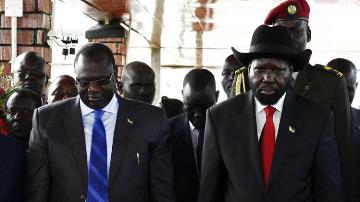South Sudan’s rival leaders to hold direct talks on Friday
May 5, 2014 (JUBA) – South Sudanese president Salva Kiir has agreed to meet face to face with former vice-president turned rebel leader Riek Machar on Friday, senior diplomats in Juba disclosed on Monday.

“I am told the meeting will take place [this] Friday 9 [April],” added the official who requested anonymity.
He, however, did not elaborate on the agenda the two leaders would discus, although many analysts and observers say the meeting would diffuse the tensions and raise hope for a cessation of hostilities.
Several leading rebel officials reached by Sudan Tribune also confirmed receiving similar notification from the mediation team. They equally said the two leaders would meet on 9 May for the first time since the conflict erupted in the country’s capital, Juba, in 15 December 2013.
“Yes, it is true we also received the same notification today (Monday) from the mediation team. We hope this will calm down the situation. On our side, Dr. Riek Machar has no problem to meet with Salva Kiir,” a key rebel leader said from Addis Ababa on Monday.
The current situation would have not developed to the level it is today if president Kiir had accepted to engage in dialogue with the other SPLM leaders before the start of violence in the country, he added.
US secretary of state John Kerry during a visit to Juba last week said the two antagonists will meet to reaffirm their commitment to the cessation of hostilities agreement and discuss a peaceful settlement to the conflict.
However rebel leader Riek Machar on Saturday said that any agreement on a power-sharing transitional government without a programme would be meaningless.
“I asked him (Kerry) what would be the purpose of a transitional government? It would not be workable without a programme to implement before elections come,” Machar told Sudan Tribune on Saturday.
“We need to have a peace agreement first with a new constitution. Putting [a] transitional government first is not realistic,” he added.
Speaking to reporters in Luanda, Angola, Kerry minimised the objections raised by the former vice-president and said the expects that the meeting between Kiir and Machar would takes place as scheduled.
“He left the door open,” Kerry said when he was speaking about Machar position, adding that the rebel leader “expressed some doubts, but he didn’t say he wouldn’t go”.
Machar “has a fundamental decision to make. If he decides not to and procrastinates then we have a number of different options that are available to us. We said we are serious and there will be accountability and implications if people do not join into this legitimate effort,” the American top diplomat further pointed out.
The bishop of the reformed Episcopal of South Sudan, Gabriel Roric, called on the two warring parties to observe the truce they agreed and to comment themselves to achieve a sustainable peace and development , adding that the Church had intensified prayers for reconciliation.
“We the Christians of different communions have come together in the common cause of peace, are deeply concerned about the growing hostilities and the suffering which our people continues to face,” Roric told Sudan Tribune in a separate interview on Monday.
He said the church would engage in prayers of penitence and petition with the people scarred and pained by the division of the nation and support the efforts of the National Council of Church for reconciliation, peace and reunification.
Roric further urged the two sides to engage in talks in good faith to end suffering. Also he called on the United States and all stakeholders involved to immediately resuming dialogue and negotiations to establish a peace agreement eliminating the threat of sanction and conventional war thereby establishing an enduring peace it also called the UN Security Council to support peace efforts between the two rivals.
(ST)
